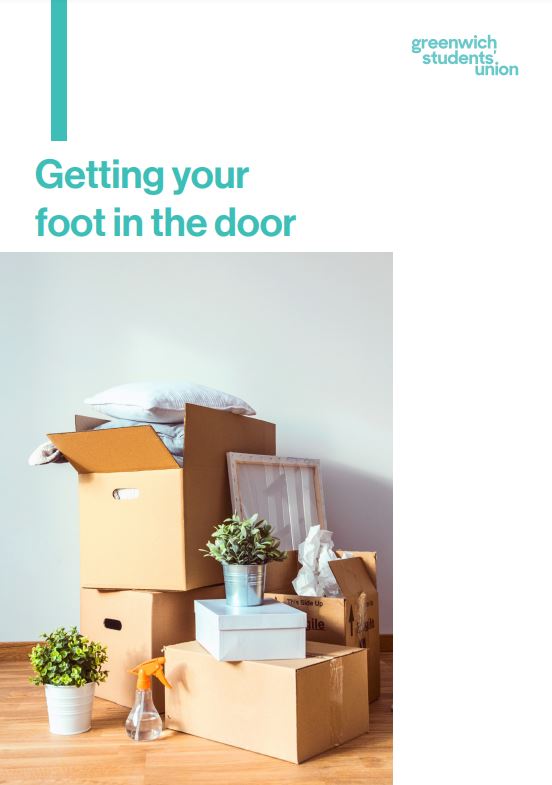Finding Private Accommodation
We want your search to find accommodation to be as straightforward as possible, so we've put together a 10 step guide to renting.
1 - Searching for accommodation
If you're looking for accommodation we've provided some sites to help you start your search. These websites can help you find a room or a whole property depending on your needs.
The properties on these sites have not been checked by us, so you should be cautious about handing over any money until you have seen the property or know it is legitimate. If you're unsure, get in touch.
You might also want to speak to an estate agent who can show you properties in the area you want to stay and at a price you can afford. You can find Accredited Residential Lettings Agents by following this link.
2 - Average rent prices
Once you have found a property you should consider if it's affordable and good value for money.
The London Rents Map shows average monthly private sector rents for different types of home across London. Search the Rents Map by entering a location and a property type in the box below. There isn't an equivalent map for Medway but local rental listings will gibe you a sense of what is affordable.
Remember that sometimes bills such as council tax, electric, broadband internet and water charges are included in the rent and sometimes they are not. Check this before you sign the lease and consider how much this might cost if it's not already included.
3 - Viewing a property
You, or someone you trust, should view the property before you sign a contract to pay any money.
If you're not in London, consider asking for a video of the property or have the person leasing the property video call you to show you around.
Consider the condition of the property. Single glazed windows might be ok in the summer but can be cold in the winter. Consider how the house is heated and ask for an energy certificate (EPC). A higher rating means the house will be cheaper to heat.
Look out for mould - especially in the bathroom and consider any visible damage.
Ask who pays for the bills in the property or if they are included in the rent.
4 - Signing a contract
When you've found a property you're happy with it's time to sign.
There are 2 main types of accommodation contracts:
- Assured shorthold tenancy agreements (commonly known as ASTs) - You’ll have an AST if you rent private accommodation from a private landlord or privately-owned student accommodation.
- License agreements - You’ll have a license agreement if you rent a room in University Halls or you live with your landlord as their lodger.
If you’re not sure what type of contract you have, contact the GSU Advice Service or you can check on the Shelter tenancy checker.
5 - What should my contract include?
At the minimum, your contract should include the following information:
Your name (s), the landlord’s name and address, or agent’s if they are managing the property
The full postal address of the property
The start and end date of the tenancy
The amount of rent and deposit payable
Confirmation of who is responsible for any bills
Confirmation of the Landlord’s responsibility to carry out essential repairs
Length of time required to bring the tenancy to an end, sometimes referred to as notice
GSU Advice can check your contract before you sign it.
6 - Paying a desposit
Holding Deposit
A holding deposit is a payment to a landlord or letting agent to reserve a property, they don't always ask for one. It is sometimes called a holding fee.
You pay it before you sign a tenancy agreement. A holding deposit cannot be more than one week’s rent for the property you want to reserve.
They might ask for now whilst they check your right to rent, run a credit check or check references. A holding deposit should be refunded in full if the landlord decides not to rent to you.
Tenancy Deposit
You should get a full refund when your tenancy ends unless there is a reason for deductions.
A tenancy deposit cannot usually be more than five weeks' rent.
You can read more about tenancy deposits here.
7 - Guarantor
Sometimes when you rent you are required to have a UK-based 'guarantor'. This is someone who agrees to pay your rent if you can't.
If you are an International or EU student and don't have a UK based guarantor you could consider using the YourGuarantor service which can act as your guarantor for a fee. You can find out information about the service here.
8 - Before moving in
Check you have received these documents
- Tenancy or rental agreement
- Inventory - a list of everything in the house and the condition it's in
- Energy performance certificate (EPC)
- Gas safety certificate
- Electrical condition installation report (ECIR)
- Government’s How to Rent booklet
- Information about where your deposit has been protected to be provided to you within 30 days of paying your deposit
9 - Applying for a council tax exemption
Your contract should specify if you have to pay council tax. If you do, you can apply for exemption from your local council which you can find here.
10 - Read our 'Getting your foot in the door' guide to renting
This guide is full of useful information for those renting for the first time.

Get in touch
We aren't able to find a property for you but we can check your contract before you sign it. You can submit your inquiry through our online form. We will aim to get back to you within three working days.
Go to our Contact Form